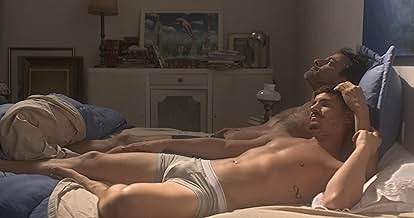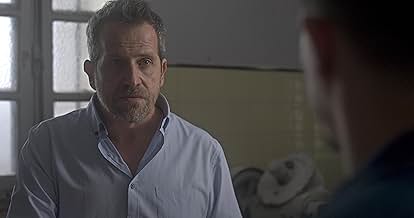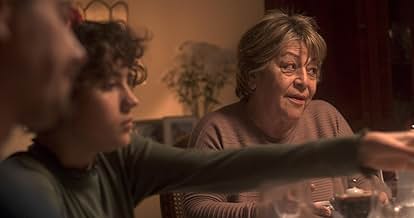Des secrets dans le placard
Original title: Todos tenemos un muerto en el placard o un hijo en el clóset
IMDb RATING
6.1/10
390
YOUR RATING
Coming out of he closet is never easy, but the gay son has already come out to his parents. They weren't happy, but they still love him. The son arrives home, only to learn that his partner ... Read allComing out of he closet is never easy, but the gay son has already come out to his parents. They weren't happy, but they still love him. The son arrives home, only to learn that his partner has dumped him.Coming out of he closet is never easy, but the gay son has already come out to his parents. They weren't happy, but they still love him. The son arrives home, only to learn that his partner has dumped him.
- Director
- Writer
- All cast & crew
- Production, box office & more at IMDbPro
Featured reviews
Summary:
This dramatic comedy effectively rounds out a story about the "return to payment" where the reconfiguration of family ties after coming out of the closet is combined with the theme of the prodigal son, professional vocation, future work, reunions and pacts and family management, forming a dynamic that does not necessarily have to do only with inbreeding village environments.
Review:
Manuel (Facundo Gambandé) is an architecture student. The film begins with him saying goodbye to his partner who is going to live in Europe. He then undertakes a trip to his hometown (Villa Mercedes, San Luis) to visit his parents, who are going to celebrate their silver wedding anniversary, and request money to travel and meet with his partner. He had not seen them since he had come out of the closet at a family dinner, which led to an argument and his departure from town on bad terms with his parents.
One of the interesting aspects of the film by Nicolás Teté (also the author of the script) is that, precisely, it does not address the moment of coming out but rather the later; he describes how Manuel (whom his parents nevertheless receive very affectionately when he arrives) tries to rebuild the family bond and put it in new terms; a family with a good time, since his father (Diego de Paula) owns a pasta factory.
Another finding is that Manuel is discovering that the family hides a secret, related to an absence that is increasingly being felt in the story, configuring another family problem that somehow "competes" and interferes with his and repeatedly shifts the leading role. Family that he intended and makes the general picture more complex. In this context, Gambandé composes an endearing and at times naive Manu who demands to be understood and accepted, while disappointments and interference with his purposes do not stop.
Teté presents his story as a dramatic comedy, admirably combining both sides of the story and avoiding melodrama. The comedy tone is partly due to the comic imprint (in the best sense) that the character of the mother María Fernanda Callejón gives to in a great performance, and to that displacement mentioned above that also becomes the dramatic core. There is a series of dialogues that exhibit great naturalness, enhanced by several of them being filmed in long still shots.
With all these components, the film achieves a story about the "return to payment" where the reconfiguration of family ties after coming out of the closet is combined with the theme of the prodigal son, professional vocation, future work, reunions and pacts and family management, forming a dynamic that does not necessarily have to do only with inbreeding village environments.
This dramatic comedy effectively rounds out a story about the "return to payment" where the reconfiguration of family ties after coming out of the closet is combined with the theme of the prodigal son, professional vocation, future work, reunions and pacts and family management, forming a dynamic that does not necessarily have to do only with inbreeding village environments.
Review:
Manuel (Facundo Gambandé) is an architecture student. The film begins with him saying goodbye to his partner who is going to live in Europe. He then undertakes a trip to his hometown (Villa Mercedes, San Luis) to visit his parents, who are going to celebrate their silver wedding anniversary, and request money to travel and meet with his partner. He had not seen them since he had come out of the closet at a family dinner, which led to an argument and his departure from town on bad terms with his parents.
One of the interesting aspects of the film by Nicolás Teté (also the author of the script) is that, precisely, it does not address the moment of coming out but rather the later; he describes how Manuel (whom his parents nevertheless receive very affectionately when he arrives) tries to rebuild the family bond and put it in new terms; a family with a good time, since his father (Diego de Paula) owns a pasta factory.
Another finding is that Manuel is discovering that the family hides a secret, related to an absence that is increasingly being felt in the story, configuring another family problem that somehow "competes" and interferes with his and repeatedly shifts the leading role. Family that he intended and makes the general picture more complex. In this context, Gambandé composes an endearing and at times naive Manu who demands to be understood and accepted, while disappointments and interference with his purposes do not stop.
Teté presents his story as a dramatic comedy, admirably combining both sides of the story and avoiding melodrama. The comedy tone is partly due to the comic imprint (in the best sense) that the character of the mother María Fernanda Callejón gives to in a great performance, and to that displacement mentioned above that also becomes the dramatic core. There is a series of dialogues that exhibit great naturalness, enhanced by several of them being filmed in long still shots.
With all these components, the film achieves a story about the "return to payment" where the reconfiguration of family ties after coming out of the closet is combined with the theme of the prodigal son, professional vocation, future work, reunions and pacts and family management, forming a dynamic that does not necessarily have to do only with inbreeding village environments.
This had the potential to be a good film. Sadly, the poor writing, unrealistic scenes and poor acting ruins this. Lead character was good, but it appears none of the adults have any idea what acting is (aside from reciting your lines). There was zero emotional connections to the pivotal scenes. It all seemed so forced and fake. Why include a crying scene by someone who has no idea how to show genuine emotion.
My biggest problem with this: it appears the writer gave up on this story, got tired or was under a deadline. After all the drama and trying to build something meaningful (albeit very poorly) ..suddenly, somehow, all the major problems are resolved and things neatly wrapped up in the last 2 minutes. Ridiculous!!
My biggest problem with this: it appears the writer gave up on this story, got tired or was under a deadline. After all the drama and trying to build something meaningful (albeit very poorly) ..suddenly, somehow, all the major problems are resolved and things neatly wrapped up in the last 2 minutes. Ridiculous!!
Todos tenemos un muerto en el placard o un hijo en el closet (2020) is an Argentinian film shown in the U.S. with the title A Skeleton in the Closet. Literally, the title is translated as We All Have a Skeleton in the Closet or a Son in the Closet. The movie was written and directed by Nicolás Teté.
Coming out of he closet is never easy, but the gay son has already come out to his parents. They weren't happy, but they still love him. The son arrives home, only to learn that his partner has dumped him.
The plot of the movie is what happens after this unpleasant event. It's not easy being gay in a macho family where your brother is a star tennis player and you're not. How the protagonist deals with the situation makes for an interesting movie. The acting and production values are solid.
We saw this film at Rochester's fabulous ImageOut LGBTQ Film Festival. It doesn't have an IMDb rating yet. I rated it 9.
Coming out of he closet is never easy, but the gay son has already come out to his parents. They weren't happy, but they still love him. The son arrives home, only to learn that his partner has dumped him.
The plot of the movie is what happens after this unpleasant event. It's not easy being gay in a macho family where your brother is a star tennis player and you're not. How the protagonist deals with the situation makes for an interesting movie. The acting and production values are solid.
We saw this film at Rochester's fabulous ImageOut LGBTQ Film Festival. It doesn't have an IMDb rating yet. I rated it 9.
Such a cute movie, one of the best ones I have been in a long time. The only down side is a bit slow but I feel that it was needed to give depth to the characters development. Recommended.
It's one of those films suffering 'message before substance' symptom, which many young directors share. I get it, director wanted it to be a more up-to-date family drama, where still the acceptance of truth and love eventually prevail... But as a whole, the delivery is weak and the happy-ending was in a hurry.
I like that each and every family member has distinctive character and story. But having spent so much time for various troubles in the family to finally surface, there was no real development and resolve. We are suddenly presented with all happy and smiling ending, but I had to ask if any of them actually learned anything and grew up in any way. Would Manuel be really happy back in the small hometown and with slightly overbearing family? Would his parents finally not mind letting other family and neighbours know their son is gay? Would Manuel's brother, who was more or less forced into the marriage by the situation, be really happy?
PS. Actor who played Manuel is cute, but it clearly shows that he never in his life cut vegetables or used a whisk. Cooking is supposed to be the character's real passion, and anybody on the set with a slightest idea of how to cook could have given him a 5 min lesson as how to use a knife and a whisk. Such small details determines whether a film feels real or fake.
I like that each and every family member has distinctive character and story. But having spent so much time for various troubles in the family to finally surface, there was no real development and resolve. We are suddenly presented with all happy and smiling ending, but I had to ask if any of them actually learned anything and grew up in any way. Would Manuel be really happy back in the small hometown and with slightly overbearing family? Would his parents finally not mind letting other family and neighbours know their son is gay? Would Manuel's brother, who was more or less forced into the marriage by the situation, be really happy?
PS. Actor who played Manuel is cute, but it clearly shows that he never in his life cut vegetables or used a whisk. Cooking is supposed to be the character's real passion, and anybody on the set with a slightest idea of how to cook could have given him a 5 min lesson as how to use a knife and a whisk. Such small details determines whether a film feels real or fake.
Did you know
- SoundtracksTu Veneno
Music by Fernando Lopez Rossi
Performed by Natalia Oreiro
Courtesy of Sony Music Entertainment Inc.
- How long is A Skeleton in the Closet?Powered by Alexa
Details
- Release date
- Country of origin
- Official site
- Language
- Also known as
- A Skeleton in the Closet
- Production company
- See more company credits at IMDbPro
- Runtime1 hour 43 minutes
- Color
- Aspect ratio
- 1.85 : 1
Contribute to this page
Suggest an edit or add missing content




















